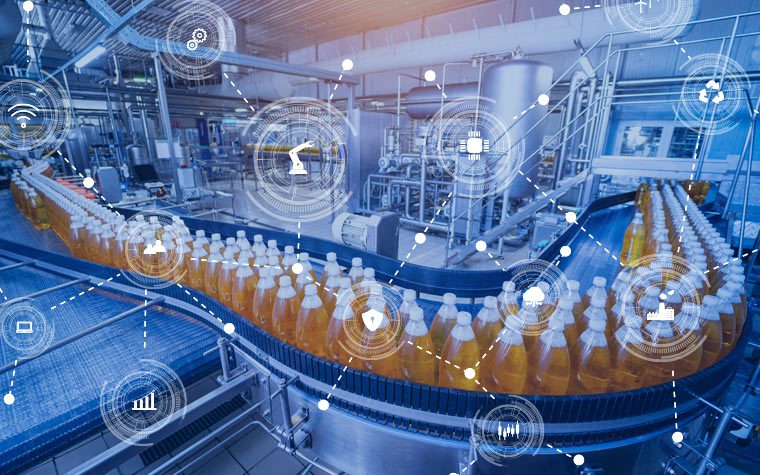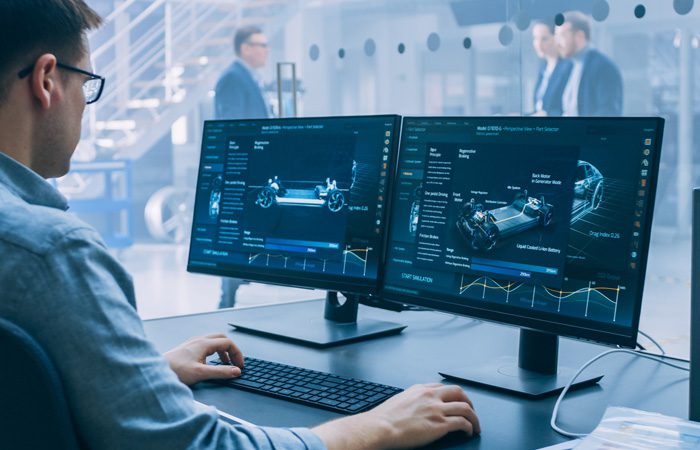
IIoT in Food and Beverage Industry: Ensuring Quality and Safety with Smart Sensors
The food and beverage industry operates under stringent standards of quality and safety due to the critical impact it has on public health. In this highly regulated environment, ensuring product quality and safety throughout the production, storage, and distribution processes is paramount. Traditional methods of quality control, often relying on periodic manual inspections, are no longer sufficient to meet the growing demands for efficiency and precision.
Enter the Industrial Internet of Things (IIoT)—an ecosystem of interconnected sensors, devices, and analytics platforms that enable real-time monitoring, automation, and data-driven decision-making. With the advent of IIoT, the food and beverage industry is witnessing a transformation, where smart sensors play a pivotal role in improving quality control, monitoring environmental factors like temperature and humidity, and ensuring compliance with increasingly stringent safety regulations.
This blog explores how IIoT is revolutionizing the food and beverage sector and the various ways smart sensors are being deployed to guarantee product quality and safety.
The Role of IIoT in the Food and Beverage Industry
IIoT refers to the integration of smart sensors and connected devices within industrial processes to collect real-time data, automate decision-making, and improve operational efficiency. In the context of the food and beverage industry, IIoT can monitor production lines, maintain proper storage conditions, ensure traceability, and flag any deviations from safety standards immediately. This results in reduced waste, fewer recalls, improved product consistency, and enhanced consumer safety.
By incorporating smart sensors, the food and beverage industry can achieve unprecedented levels of quality control and safety throughout the entire supply chain. These sensors capture critical data related to temperature, humidity, pressure, gas levels, and even the chemical composition of food products. The ability to monitor and adjust these factors in real time allows producers to maintain high-quality standards while reducing human intervention, errors, and the risk of contamination.
Real-Time Monitoring of Temperature and Humidity
Temperature and humidity are two of the most critical environmental factors in food production and storage. Maintaining the correct conditions is essential to prevent spoilage, bacterial growth, and loss of product quality. For perishable goods such as dairy, meat, and seafood, even slight deviations in temperature can lead to spoilage, posing health risks and resulting in significant financial losses.
With the implementation of IIoT solutions, smart sensors can monitor temperature and humidity levels continuously and in real time. Here’s how it works:
- Precision Monitoring: IIoT-enabled sensors are installed in various parts of the production facility, storage rooms, or transport vehicles. These sensors track the environmental conditions and provide real-time data on critical factors such as temperature and humidity.
- Immediate Alerts and Adjustments: If a temperature anomaly is detected, the system can automatically alert operators or adjust the cooling systems. For example, a slight increase in temperature in a refrigerated truck can trigger an automatic increase in cooling power, ensuring that the products are preserved at optimal conditions.
- Data-Driven Insights: Beyond real-time monitoring, IIoT sensors collect historical data that can be analyzed to optimize storage strategies. This helps to reduce energy consumption, prevent spoilage, and improve overall operational efficiency.
- Cold Chain Management: The food supply chain, especially for perishables, is extremely sensitive to temperature variations. Smart sensors integrated with IIoT ensure end-to-end monitoring, from production facilities to retail shelves. Any deviations in the cold chain are instantly detected, minimizing the risk of foodborne illnesses and spoilage.
Smart Sensors for Quality Control and Process Optimization
One of the biggest advantages of IIoT in food production is the ability to monitor the quality of food products continuously. Smart sensors can detect a wide range of parameters that are crucial to product quality, such as pH levels, moisture content, gas composition, and chemical properties. This real-time monitoring allows manufacturers to quickly identify any deviations from the desired standards and take corrective actions.
For instance, in beverage production, ensuring the correct CO2 levels is vital for carbonation in sodas and beers. Smart sensors embedded in the production lines can measure gas levels and automatically adjust the input to ensure product consistency. Similarly, in baked goods, monitoring moisture levels ensures that products do not become too dry or soggy, maintaining the intended texture and taste.
Some key applications of smart sensors in quality control include:
- Detection of Contaminants: Sensors can detect contaminants or foreign particles in food products, ensuring that only safe products make it to consumers. This is especially important in industries dealing with high-risk products like meat and dairy, where contamination can lead to foodborne illnesses.
- Monitoring of pH and Chemical Composition: Many food products require precise pH levels and chemical compositions to ensure safety and shelf life. For example, pH sensors are used in dairy production to ensure that milk and cheese products are processed under optimal conditions.
- Automating Quality Inspections: Traditionally, quality control in food production involves manual inspections and testing at regular intervals. With smart sensors, quality control can become an automated and continuous process. Sensors can monitor product parameters throughout production and packaging, ensuring that every item meets the required standards.
- Enhanced Traceability: Sensors connected to IIoT systems allow for complete traceability of food products from the farm to the table. This enables manufacturers to track every stage of production, ensuring that the final product is of the highest quality. If a contamination issue arises, the source can be quickly identified, and only the affected batches can be recalled, minimizing waste.
Ensuring Compliance with Safety Regulations
The food and beverage industry is subject to a wide range of safety regulations and standards aimed at protecting consumers from health risks. Compliance with these regulations is often a labor-intensive and error-prone process, involving manual record-keeping, periodic audits, and complex documentation.
IIoT simplifies this by automating compliance with food safety standards such as Hazard Analysis Critical Control Points (HACCP) and Food Safety Modernization Act (FSMA) requirements. Through the use of smart sensors, food manufacturers can monitor critical control points in real time, ensuring that safety standards are met consistently.
- Automated Record Keeping: IIoT systems automatically log all sensor data, creating a comprehensive record of environmental conditions, process parameters, and quality checks. This data is stored digitally and can be accessed instantly during audits or inspections, making compliance more efficient and transparent.
- Continuous Monitoring of Critical Control Points: In a traditional HACCP plan, operators manually check critical control points (CCPs) at regular intervals. With IIoT, these CCPs are monitored continuously, and any deviations are flagged in real time. For example, if a temperature-controlled storage area exceeds a set threshold, the system can automatically alert staff and trigger corrective actions.
- Risk Mitigation and Recall Prevention: IIoT enables proactive risk management by detecting potential safety issues before they escalate. For example, if sensors detect rising bacterial levels in a batch of products, the batch can be quarantined, preventing a larger contamination issue and avoiding costly recalls.
Predictive Maintenance and Reduced Downtime
Another critical aspect of quality and safety in the food and beverage industry is the performance of machinery and equipment. Unplanned equipment failures can lead to production halts, compromising product quality and safety. IIoT facilitates predictive maintenance, where sensors continuously monitor the condition of equipment and predict when maintenance is needed.
Smart sensors embedded in machinery can track vibration, pressure, and temperature levels, providing real-time data on equipment health. If sensors detect any abnormalities—such as unusual vibrations in a conveyor belt or overheating in a refrigeration unit—alerts are sent to maintenance teams to address the issue before it results in a breakdown.
Predictive maintenance helps reduce downtime, extend the lifespan of equipment, and prevent production delays that could affect product quality.
Takeaway
The integration of IIoT and smart sensors in the food and beverage industry is revolutionizing the way products are produced, monitored, and delivered. From ensuring the consistent quality of products to maintaining optimal environmental conditions and complying with safety regulations, IIoT offers a wide range of benefits.
Real-time monitoring of temperature, humidity, and critical control points reduces waste and minimizes the risk of contamination, while automating quality control and predictive maintenance enhances operational efficiency. As the food and beverage industry continues to evolve, IIoT and smart sensors will remain central to ensuring the highest standards of quality and safety for consumers, meeting regulatory requirements, and enabling businesses to stay competitive in an increasingly connected world.


